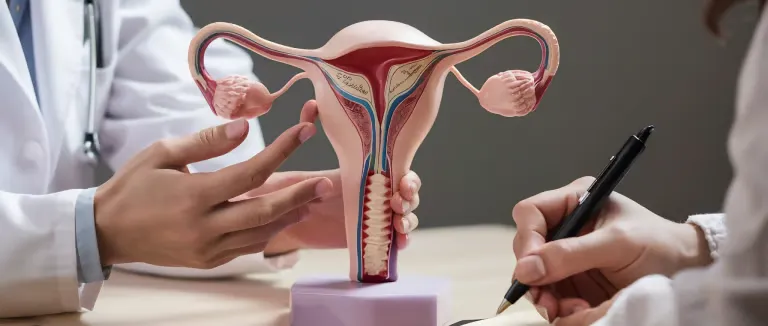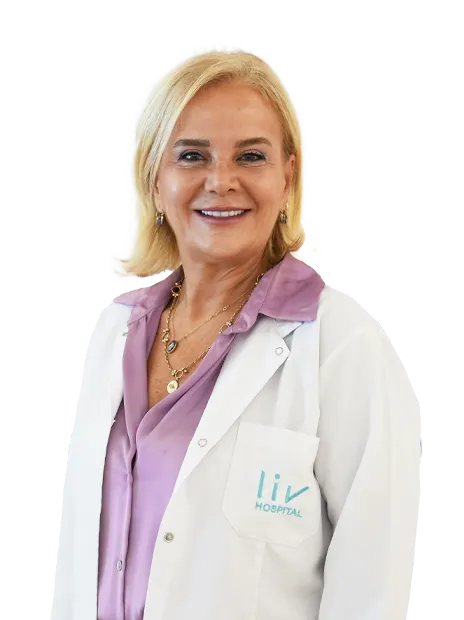-
What is Polycystic Ovary Syndrome (PCOS)?
-
Recognising the Symptoms of PCOS
-
How is PCOS Diagnosed at Liv Hospital?
-
Comprehensive PCOS Treatment Approaches
-
Addressing PCOS-Related Infertility
-
Why Choose Turkey for Your PCOS Treatment?
-
Liv Hospital: Leading PCOS Care with Advanced Technology
-
Living Well with PCOS: Long-Term Management and Support
-
Frequently Asked Questions
Polycystic Ovary Syndrome (PCOS) is a common hormonal disorder in women of reproductive age, characterized by irregular menstrual cycles, excess androgen levels, and polycystic ovaries.

What is Polycystic Ovary Syndrome (PCOS)?
Polycystic Ovary Syndrome (PCOS) is a common endocrine condition affecting up to 10% of women of reproductive age. It is characterised by hormonal imbalance, ovulatory dysfunction and the presence of multiple small cysts on the ovaries.
Understanding the Hormonal Imbalance in PCOS
PCOS involves excess androgens (“male” hormones), reduced or irregular progesterone production and often elevated insulin. These disrupt the normal menstrual cycle, prevent regular ovulation and trigger many visible symptoms.
Common Causes and Risk Factors for PCOS
PCOS causes hormonal imbalances and insulin resistance that disrupt normal ovarian function and lead to symptoms like irregular periods and infertility.
While the exact cause remains unclear, genetics, family history, insulin resistance, low-grade inflammation and environmental factors all contribute. Having a mother or sister with PCOS, being overweight, or experiencing early puberty heightens risk.
Recognising the Symptoms of PCOS
PCOS symptoms include irregular periods, excessive hair growth, acne, weight gain, and difficulty with fertility due to hormonal imbalances.
Irregular Menstrual Cycles and Ovulation Issues
Cycles longer than 35 days, missed periods, or fewer than eight periods per year suggest anovulation, a core PCOS feature.
Signs of Excess Androgens (Hirsutism, Acne, Hair Loss)
Dark, coarse hair on the face or body, persistent acne or thinning scalp hair signal androgen excess.
Polycystic Ovaries on Ultrasound
Transvaginal or pelvic ultrasound may show enlarged ovaries with a “string-of-pearls” pattern of follicles.
Metabolic Symptoms (Weight Gain, Insulin Resistance)
Many women struggle with weight management, central obesity, sugar cravings and fatigue—clues to underlying insulin resistance.
How is PCOS Diagnosed at Liv Hospital?
Comprehensive Medical History and Physical Examination
Our specialists discuss your cycle, weight changes, skin problems and family history, then perform a targeted examination (BMI, blood pressure, acne or hair pattern scoring).
Hormone Level Testing
Blood tests measure LH, FSH, prolactin, testosterone, SHBG, fasting insulin and glucose to identify the PCOS hormonal imbalance and rule out thyroid or adrenal disorders.
Pelvic Ultrasound Examinations
High-resolution transvaginal ultrasound determines ovarian volume, antral-follicle count and endometrial thickness.
Ruling Out Other Conditions
We exclude congenital adrenal hyperplasia, Cushing’s syndrome, hyperprolactinaemia and thyroid disease to confirm a definitive PCOS diagnosis.
Comprehensive PCOS Treatment Approaches
PCOS treatment focuses on managing symptoms and may include lifestyle changes, hormonal birth control, insulin-sensitizing medications, and fertility treatments if pregnancy is desired.
Lifestyle Modifications: Diet and Exercise
A Mediterranean-style or low-GI PCOS diet, regular aerobic activity and strength training improve insulin sensitivity, promote PCOS weight loss and restore ovulation in many women.
Medical Management for Symptom Control
- Combined oral contraceptives regulate cycles and reduce androgen symptoms.
- Anti-androgens (e.g., spironolactone) target hirsutism and acne.
- Topical treatments or laser therapy complement medical care for skin and hair concerns.
Managing Insulin Resistance and Metabolic Concerns
Metformin lowers insulin and androgen levels, supporting weight management and spontaneous ovulation while reducing long-term risk of type 2 diabetes, metabolic syndrome and cardiovascular disease.
Treatments for infertility resulting from PCOS include lifestyle modifications (such as weight loss and exercise), ovulation-inducing medications like clomiphene citrate or letrozole, insulin-sensitizing drugs like metformin, and assisted reproductive technologies such as in vitro fertilization (IVF) when other methods are unsuccessful.
Addressing PCOS-Related Infertility
PCOS fertility problems arise from hormonal imbalances that disrupt ovulation, making it challenging for women to conceive naturally.
Understanding Fertility Challenges with PCOS
Without regular ovulation, egg release is unpredictable. Elevated LH and insulin also disrupt egg quality and endometrial receptivity.
Ovulation Induction Therapies
First-line options include letrozole or clomiphene citrate; injectable gonadotropins follow if oral agents fail. Monitoring at Liv Hospital minimises ovarian hyperstimulation risk.
Assisted Reproductive Technologies (IVF) at Liv Hospital
When induction is unsuccessful or severe male-factor infertility co-exists, in-vitro fertilisation offers high success rates. Our embryology lab utilises time-lapse incubators and pre-implantation genetic testing to optimise outcomes.
Surgical Options for Fertility
Laparoscopic ovarian drilling can lower androgen production and induce ovulation in select, clomiphene-resistant patients.

Why Choose Turkey for Your PCOS Treatment?
Access to High-Quality Medical Care at Competitive Costs
Turkey combines internationally accredited hospitals, cutting-edge technology and affordable pricing, making advanced PCOS care accessible.
Experienced Specialists and Advanced Medical Infrastructure
Liv Hospital attracts leading gynecologists, endocrinologists and reproductive specialists trained in Europe and the USA.
A Welcoming Destination for International Patients
Our multilingual coordinators assist with visas, transfers and accommodation, ensuring a stress-free medical journey.
Liv Hospital: Leading PCOS Care with Advanced Technology
Our Multidisciplinary Team Approach
We integrate Gynecology, Reproductive Endocrinology, Nutrition-Dietetics, Psychology and Bariatric Surgery when needed, providing 360-degree PCOS management.
State-of-the-Art Diagnostic and Treatment Facilities
- 3-Tesla MRI for pituitary or adrenal evaluation
- High-definition laparoscopy suites
- On-site genetics and metabolism laboratories
Personalised Treatment Plans for International Patients
Each plan respects cultural preferences, travel timelines and follow-up logistics, delivered via secure telemedicine after you return home.
Success Stories in PCOS Management and Fertility
Our live-birth rates in PCOS IVF cycles exceed European averages. Many patients achieve natural conception after integrated lifestyle and medical programmes.
Living Well with PCOS: Long-Term Management and Support
Managing Long-Term Health Risks (Diabetes, Heart Disease)
Untreated insulin resistance raises lifetime odds of type 2 diabetes, dyslipidaemia and hypertension. Regular glucose tolerance tests and lipid panels are crucial.
Importance of Regular Check-ups and Monitoring
Annual ultrasounds, metabolic screenings and dermatologic assessments catch complications early.
Mental Health and Emotional Well-being Support
PCOS heightens risks of anxiety, depression and body-image distress. Our counsellors and support groups help patients build resilience and positive self-esteem while living with PCOS.

Frequently Asked Questions
What exactly is PCOS?
It’s a hormonal disorder with excess androgens, irregular ovulation and polycystic ovaries.
What are the most common signs of PCOS?
Irregular periods, unwanted hair growth, acne, weight gain and infertility.
How is PCOS officially diagnosed?
Using the Rotterdam criteria: two of three findings - ovulatory dysfunction, hyperandrogenism (clinical or biochemical) and polycystic ovaries on ultrasound.
Can PCOS be completely cured?
It is manageable rather than curable. Symptoms and risks can be controlled with lifestyle, medication and ongoing monitoring.
Does PCOS always cause infertility?
No. Many women conceive naturally or with medical support once ovulation is restored. But
What treatments does Liv Hospital offer for PCOS-related infertility?
PCOS infertility affects many women by interfering with regular ovulation, making it harder to achieve pregnancy without medical intervention. We provide ovulation induction, IVF with personalised protocols, ovarian drilling and metabolic optimisation.
Is weight loss necessary to manage PCOS?
A 5-10 % weight reduction can markedly improve hormones, cycles and fertility but treatment is holistic—thin women with PCOS also receive tailored therapy.
What are the long-term health implications of having PCOS?
Higher risk of type 2 diabetes, cardiovascular disease, endometrial cancer, sleep apnoea and mood disorders.
How can Liv Hospital help international patients seeking PCOS treatment?
Dedicated coordinators handle travel, translators, finance packages and remote follow-up, ensuring continuity of care.
* Contents of this page is for informational purposes only. Please consult your doctor for diagnosis and treatment. The content of this page does not include information on medicinal health care at Liv Hospital .









